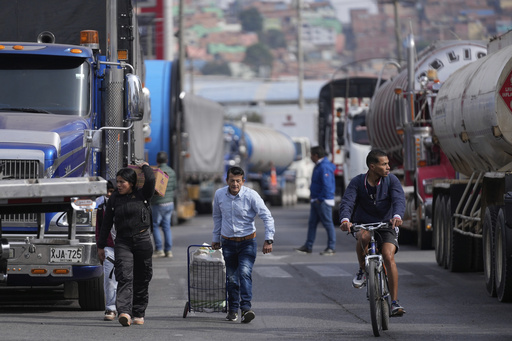
Thousands of Colombians faced challenges getting to work on Tuesday as truckers in major cities staged protests by blocking highways over a recent rise in diesel fuel prices. Truckers unions argue that the government’s decision to remove diesel fuel subsidies would severely impact their businesses, while President Gustavo Petro’s administration defends the move as necessary to reduce the budget deficit and allocate more funds to education and health.
Following discussions with truckers unions, the government increased diesel fuel prices to approximately $2.90 per gallon, up by 50 cents, leading to widespread demonstrations across the country. Protest actions intensified on Tuesday with blockades in cities like Bogotá, Medellin, and Cali, resulting in a decrease in the supply of food to wholesale markets.
Diego Torres, a trucker based in Bogotá, expressed concerns about the higher fuel prices, stating that he would incur losses on each delivery of construction materials in the city. He highlighted additional challenges faced by truckers, such as increased crime rates along rural routes.
President Petro, known for his activism, vowed not to allow the truckers unions to disrupt the nation, emphasizing the necessity of eliminating fuel subsidies to manage public debt and support vital sectors like health and education. The government estimates that diesel fuel subsidies cost around $240 million monthly, paid to state oil company Ecopetrol.
As the government plans to phase out diesel fuel subsidies in three stages to allow transport companies to adjust, discussions are ongoing to find ways to compensate for the increased operational costs faced by truckers. The Finance Ministry is gearing up to present a tax reform proposal to congress aimed at raising government revenues by $3 billion next year, including plans to raise wealth taxes, taxes on non-wage personal income, and sales taxes on hybrid cars and online betting.
Petro’s administration has seen a significant increase in annual budget spending by about 30% in efforts to enhance social welfare programs and expand the public sector workforce. The discussions around fuel subsidies come amidst broader fiscal reforms aimed at strengthening the country’s financial position and supporting key social services.
